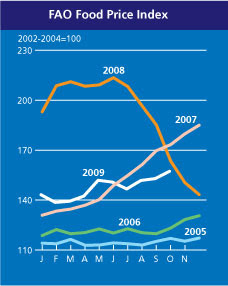Alex Evans from the Global Dashboard has commented in a recent post on the lack of political initiatives to take preventive action regarding food (and resources in general) scarcity. The window of opportunity presented them by the credit crunch and the global downturn starts to close with rising oil prices.
As we are barely climbing out from the worst recession since 1930, oil prices have reached mid 2007 levels already. Together with that, food prices have followed suit:

As I’ve argued in numerous previous posts, we were never out of the woods on the food / fuel pincer movement; it was the collapse in prices following the credit crunch that was the blip, not the price spike that preceded it. And what’s most frustrating now is the extent to which policymakers have frittered away the chance we had to get onto a more secure footing.[...] Now, on top of all of that, it looks like policymakers are also in the process of fudging the one policy process that could manage oil scarcity and climate change at the same time: the Copenhagen talks on the UNFCCC post-2012 commitment period.The problem, of course, is that once prices for oil and food rise beyond a certain level, we all go back into kneejerk / panic mode – and try talking about the need for cooperative long term frameworks then. Sigh. #Fail.

